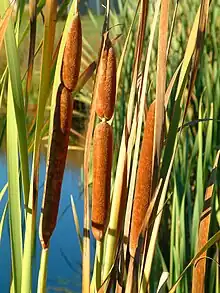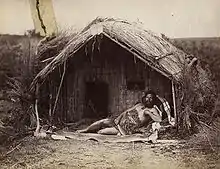Typha orientalis
Typha orientalis, commonly known as bulrush, cumbungi,[2] or raupō, is a perennial herbaceous plant in the genus Typha. It is native to Australia, New Zealand, Malaysia, Indonesia, Japan, Korea, Mongolia, Myanmar, Philippines, China and the Russian Far East (Sakhalin and Primorye).[3][4]
| Typha orientalis | |
|---|---|
 | |
| Leaves and flower spikes of Typha orientalis | |
| Scientific classification | |
| Kingdom: | Plantae |
| Clade: | Tracheophytes |
| Clade: | Angiosperms |
| Clade: | Monocots |
| Clade: | Commelinids |
| Order: | Poales |
| Family: | Typhaceae |
| Genus: | Typha |
| Species: | T. orientalis |
| Binomial name | |
| Typha orientalis | |
| Synonyms | |
| |
T. orientalis is a wetland plant that grows on the edges of ponds, lakes, salt marshes, and slow flowing rivers and streams.
Use
Known as raupō in New Zealand,[5] the plant was quite useful to Māori. The rhizomes were cooked and eaten, while the flowers were baked into cakes. The leaves were used for roofs and walls and occasionally for canoe sails,[6] as well as a material for making kites.[7] Māori introduced the plant to the Chatham Islands.[3]

A traditional Māori whare (house)
References
- Zhuang, X. (2011). "Typha orientalis". IUCN Red List of Threatened Species. 2011: e.T168629A6524306. doi:10.2305/IUCN.UK.2011-2.RLTS.T168629A6524306.en. Retrieved 19 November 2021.
- "Typha orientalis". Flora of Australia. Australian Biological Resources Study, Department of Agriculture, Water and the Environment, Canberra. Retrieved 28 March 2020.
- "Distribution".
- Flora of China, v 23 p 161.
- Johnson, Peter (24 Sep 2007). "Wetlands - Reeds, rushes, sedges and low growers". Te Ara - the Encyclopedia of New Zealand. Retrieved 28 March 2020.
- Lawrie Metcalf (1998). The Cultivation of New Zealand Native Grasses. Auckland, New Zealand: Random House. p. 48.
- Neich, Roger (1996). "New Zealand Maori Barkcloth and Barkcloth Beaters". Records of the Auckland Institute and Museum. 33: 111–158. ISSN 0067-0464.
This article is issued from Wikipedia. The text is licensed under Creative Commons - Attribution - Sharealike. Additional terms may apply for the media files.
